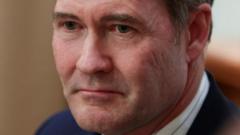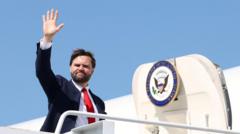In a recent clash over political classifications, Germany’s Foreign Office reaffirmed its labeling of the Alternative für Deutschland (AfD) party as right-wing extremist. This decision drew ire from notable U.S. politicians, prompting a direct response from German officials emphasizing the need to confront right-wing extremism.
Germany Upholds AfD's Extremist Designation Amid U.S. Criticism

Germany Upholds AfD's Extremist Designation Amid U.S. Criticism
Germany's Foreign Office stands firm on classifying the AfD as a right-wing extremist party, despite backlash from U.S. officials.
In the wake of considerable international scrutiny, including pointed remarks from U.S. Vice-President JD Vance, who accused the German government of enacting "tyranny in disguise," and Secretary of State Marco Rubio, who criticized the classification as an affront to democracy, Germany’s Foreign Office defended its assertion. The rationale behind the designation centers on findings from the Bundesamt für Verfassungsschutz (BfV), Germany's intelligence agency, which determined that AfD's ideologies undermine the democratic fabric by promoting ethnic-based exclusions.
The AfD, which secured a significant 20.8% of votes in the latest federal elections, now faces enhanced monitoring privileges due to this classification—a move described by the party leadership as politically motivated and detrimental to democracy. Deputy parliamentary leader Beatrix von Storch echoed that this was indicative of authoritarian measures reminiscent of historical totalitarian regimes.
In a direct retort, the German Foreign Office asserted that the findings stemmed from a "thorough and independent investigation," underscoring the lessons learned from Germany’s tumultuous past under Nazi rule. The growing backlash against AfD has sparked renewed discussions about potentially banning the party altogether—a notion supported by SPD leader Lars Klingbeil, especially in light of coalition talks to confirm Friedrich Merz as the new chancellor.
With this unfolding situation, the tension between safeguarding democratic principles and addressing emergent extremist ideologies remains at the forefront of both German and international political discourse.
The AfD, which secured a significant 20.8% of votes in the latest federal elections, now faces enhanced monitoring privileges due to this classification—a move described by the party leadership as politically motivated and detrimental to democracy. Deputy parliamentary leader Beatrix von Storch echoed that this was indicative of authoritarian measures reminiscent of historical totalitarian regimes.
In a direct retort, the German Foreign Office asserted that the findings stemmed from a "thorough and independent investigation," underscoring the lessons learned from Germany’s tumultuous past under Nazi rule. The growing backlash against AfD has sparked renewed discussions about potentially banning the party altogether—a notion supported by SPD leader Lars Klingbeil, especially in light of coalition talks to confirm Friedrich Merz as the new chancellor.
With this unfolding situation, the tension between safeguarding democratic principles and addressing emergent extremist ideologies remains at the forefront of both German and international political discourse.




















